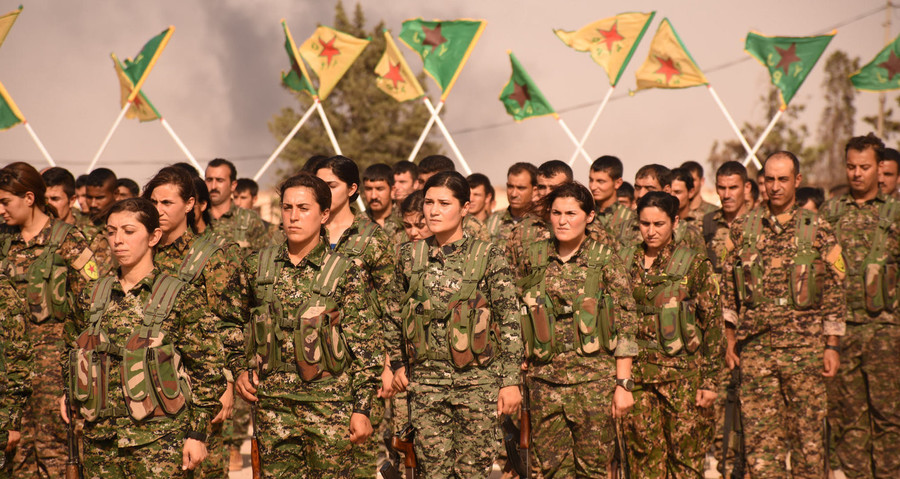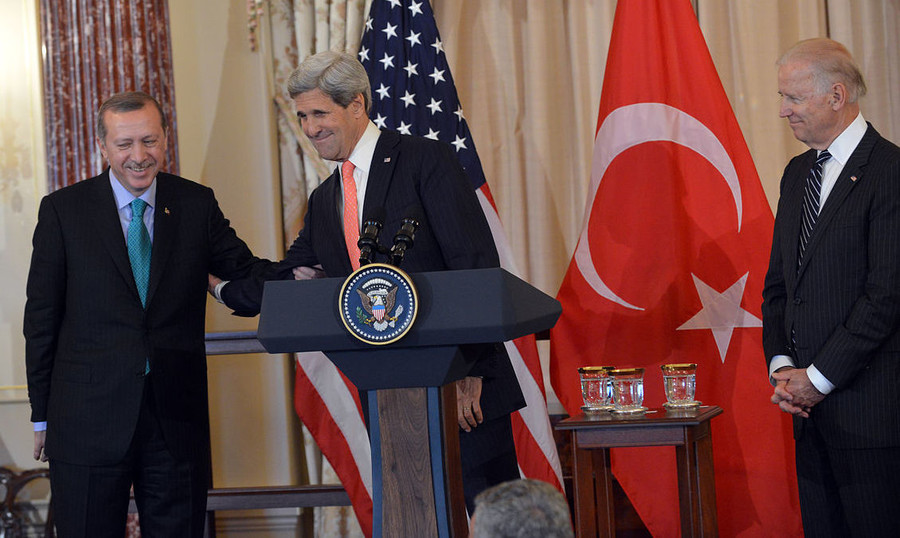The Betrayal of Syria’s Kurds
From Moscow to Washington, we are told that the principle enemy in the Middle East is the Islamic State (IS) terrorist organization. At the same time, the outside powers that have intervened in Syria’s horrendous conflict are waging a phantom war against IS as a cover for separate military campaigns that end up empowering these very same barbarians.
We’ve known that the Russians and the Iranians have been following this strategy for at least three years. Both Russian dictator Vladimir Putin and the Islamist mullahs in Tehran have backed the regime of President Bashar al Assad to the hilt, with the tacit approval of the United States. As the Wall Street Journal reported recently, the Obama Administration’s determination to secure last year’s flimsy nuclear agreement with the Iranians meant that the “red lines” the president declared in Syria over Assad’s use of chemical weapons turned out to be a more anemic color. The Iranians got their deal and all the financial benefits that went with it, while the peoples of Syria and the entire region were forced to realize that, under Obama, the much vaunted American empire is actually what Chairman Mao [Zedong] once called a paper tiger.
Just as the war against Islamic State has, for Russia and Iran, been a war to keep Assad in power and extend the territory under his control, so it is with Turkey, which last week sent its troops over the border into Syria. The Turks say they are targeting IS, but in the same way that the Russians and Iranians have turned their firepower on civilian targets and non-Islamist rebels alike – strengthening IS by default – Turkey’s real agenda in Syria is to crush the burgeoning Kurdish national movement in the north and east of that country.
The visceral hostility of Turkish Prime Minister Recep Tayyip Erdogan to Kurdish aspirations has been well documented. In the wake of July’s failed military coup, Erdogan has banked the messages of support from foreign leaders, particularly in the United States, to launch a crackdown on the universities and the press, and to continue the demonization of Turkey’s own Kurdish minority as a fifth column threatening the country’s integrity.
Erdogan set the tone for his latest campaign against the Kurds at a rally in Istanbul a few days after the coup attempt, when the Turkish leader addressed a massive crowd waving banners with such IS-style slogans as, “Order us to die, and we will do so.” Erdogan’s call for national unity, however, did not extend to the Kurds, and the pro-Kurdish HDP party was deliberately excluded from the rally. As one of the leaders of the HDP, Figen Yuksekdag, pointed out in an interview with the Kurdish website Rudaw, the coup was carried out by the same Turkish military that had repeatedly attacked the Kurds. Now Erdogan, he added, is “kicking the HDP out of the political conversation in the country.”
On the military front, the Turks have long been concerned by the successes of the Kurdish YPG militia in Syria, claiming that these fighters are indistinguishable from the militants of the PKK, who have been fighting Ankara’s rule in the southeast of Turkey for decades. The U.S., it should be said, does not share this view, and regards the YPG as the most able and courageous fighters in that part of the Middle East. “[W]e draw clear delineation between the PKK and the Syrian Kurds, as I said, who are part of the many groups that are fighting against Daesh,” U.S. State Department spokesman John Toner explained on July 2.” Toner added that Washington had been in dialogue with the Turks over its support “for those Kurdish forces who are, frankly, very capable forces fighting to remove Daesh from its foothold in northern Syria.”
And yet now that Turkey is attacking an ally of the U.S., the Obama Administration is restricting itself to verbal criticism. U.S. Defense Secretary Ash Carter is one of several officials to have called on both Turkey and its local allies and the Syrian Kurds to concentrate on defeating IS, rather than each other. But Secretary of State John Kerry has already shifted the balance towards the Turks. Speaking at an August 26 press conference in Geneva with his Russian counterpart, Sergei Lavrov, Kerry played down the U.S. relationship with the YPG, speaking of a “limited engagement” with “a component of Kurdish fighters on a limited basis.”
These are, frankly, mealy-mouthed words, given the central role played by the Kurds in liberating the town of Manbij, just south of the border with Turkey, from IS. It also shamefully ignores that the YPG is the only military force in Syria to have carried out a humanitarian operation, rescuing thousands of sick and dying Yazidis in the Sinjar region from further massacres and other outrages, including the kidnapping of young girls, by IS terrorists in the winter of 2015.
On top of that, the U.S. now looks like it has been blindsided by the Turkish offensive, thereby delivering another blow to America’s standing in the region. The State Department behaves as if it really believes that war against IS can be separated from the other challenges in the region, whereas a successful policy needs to deal with the unresolved issues that allowed IS to flourish in the first place.
Chiefly, this means setting the removal of the Assad regime as a specific goal, and seeking a political solution that will permit all the nations and ethnicities in northern Syria – Arabs, Kurds and Turkomans among them – to live with a minimum of conflict. As long as Turkey carries out its aggression against Syria under the pretext of pushing the Kurds east of the Euphrates river, and as long as Iran and Russia continue to back Assad with impunity, Syria’s agony will continue.
We have been in this position many times before. Some might remember that in September 2013, Putin penned an Op-Ed for the New York Times in which he praised Obama for seeing the opportunity behind “the Syrian government’s willingness to place its chemical arsenal under international control for subsequent destruction.” We all know where that led us.
The next American president will face a stark choice. Either succumbing to a regional alignment that now includes Turkey, which has abandoned its longstanding aim of demanding Assad’s removal, alongside Iran and Russia, or striking out on a different path to end Syria’s suffering and the extraordinary instability that goes with it.
Ben Cohen is editor of Tower.Org.

 48.0°,
Overcast
48.0°,
Overcast 







